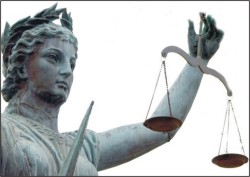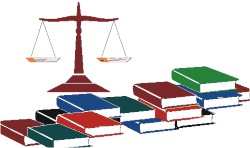Legal Education
Teaching Law for Development?
Legal education: Needs major overhaul
Ridwanul Hoque
 The foundation for the service the legal community offers to any nation is grounded in its legal education system. Bangladesh's legal education today is in need of thoughtful, society-specific overhauling. Law is taught at three different types of institutions of disproportionately varying quality. The regulatory body for the legal profession, the Bangladesh Bar Council, is largely indifferent of its duty to improve the standards of legal education. On the other hand, neither the University Grants Commission nor the Education Ministry does have any special oversight over the legal education.
The foundation for the service the legal community offers to any nation is grounded in its legal education system. Bangladesh's legal education today is in need of thoughtful, society-specific overhauling. Law is taught at three different types of institutions of disproportionately varying quality. The regulatory body for the legal profession, the Bangladesh Bar Council, is largely indifferent of its duty to improve the standards of legal education. On the other hand, neither the University Grants Commission nor the Education Ministry does have any special oversight over the legal education.
Law is taught in 6 public universities and around 35 private universities, which provide a four-year law degree, as well as in around 80 law colleges where courses towards a traditional two-year law degree are taught in evening classes. Teaching law at 'colleges', where both students and teachers are 'part-timers', has a long history, going back to the mid-19th century. But, today, legal education in these law colleges, unlike in India or Pakistan, is the weakest and the least regulated. The postgraduate degrees in law (LLM) are offered only at universities. In addition to formal legal training, the Bar Council offers professional legal trainings for the new entrants to the legal profession, which too suffer the problem of effectiveness. Non-university law institutions are a rarity in Bangladesh. The South Asian Institute of Advanced Legal and Human Rights Studies (SAILS) is generally expected to do a lot more in the legal education sector. The Bangladesh Institute of Law, a government-funded institute, which has its own stake of contribution to legal education, has been activated only recently.
The courses offered at university law schools and colleges are widely divergent. The universities offer around 28 modules on an average, while the law colleges have been offering only 13 subjects. There are no 'core law subjects' officially provided by the Bar Council. Although the law schools have in recent years introduced many new subjects such as cyber law and consumer law, the content, quality and coverage of their syllabi are at the fore of debates surrounding the quality of legal education. For example, many subjects with immediate significance for development such as the mineral resources law are left out. Also, law in Bangladesh is not generally taught in the social and multidisciplinary contexts, and the focus on legal research in the law departments is remarkably minimal. Even, legal research is not a compulsory subject in the leading public universities; nor is the subject law and society taught at any university. Law students are not 'recognized' as contributors to the university law journals. Nor does any law school have any research centre or specialized centre of legal studies.
What do the Bangladeshi law schools do by imparting legal education? This debate, which is quite strong and ever-live in the West, has not attracted that much intense engagement, although everyone seems largely critical of the role of law schools. Interestingly, no government agency or professional body has ever stated any objectives of legal education, let alone pursuing any concrete policy on legal education (Alam, 2007).
Is or should be the legal teaching aligned with the socio-economic development? Are law schools merely giving out degrees or, at the best, producing certain legal plumbers? These questions are to be answered in light of the perceived 'job' of the law itself in Bangladesh. If the law has to be seen as an instrument of social change and if its job is to realize the constitutional goal of a just and rule-of-law-based society, then it is not hard to deduce the objectives the legal education should pursue.
In Bangladesh, liberalization of economy began in the late 1980s and since the mid-90s a series of donors-led legal reforms were set out. A permanent law commission and a judicial training institute were established, but the legal education per se did not receive any notable attention form the reformers. Earlier, however, in the early-1990s clinical legal education programmes were introduced ad hoc in 3 major public universities. The underlying assumptions of these programmes were that the law graduates should be trained to cater for the modern social and developmental needs of society. At the same time, 'the law' was arguably given the developmental job. For example, the Law Commission's constitutive statute underscored the need for new laws that would attract foreign investment and thus foster national development. Unlike in many other countries, the Law Commission was also charged with the task of recommending measures for the improvement of legal education. Silently, by this, an agenda of attuning the country's legal education to its developmental needs was clearly drawn. To what extent this new agenda has been understood by the concerned actors or legal education been premised on social needs is, however, an altogether different question.
 Teaching law in Bangladesh is fraught with a black-letter approach, and is frustratingly traditional in the sense of lacking a vision for development __ social, economic, and governmental. There is a marked absence of human rights and social justice approaches to legal education. The narrow demand from the legal market is also to some extent culpable for this. Law schools are expected of producing 'skilled' (trainee) lawyers alone, who would easily win the cases and put lesser burden on the pedagogic roles of the 'senior' lawyers. There are other walks of the legal profession (such as the judiciary, academia, in-house corporate legal officers, legal draftsmen, freelance legal researchers, development activists and so on) for which well-sensitized law graduates are to be produced. A 2007 Law Commission Report on legal education, first of its kind in Bangladesh, emphasised on "modern and socially relevant legal education" for national development. As the Report summarised, "academically sound and vocationally skillful law graduates would make great human resource for various sectors of our national development". This brings our attention to the fact that, legal education in Bangladesh should combine the teaching of law as a subject of humanity and the teaching of law as a vocation.
Teaching law in Bangladesh is fraught with a black-letter approach, and is frustratingly traditional in the sense of lacking a vision for development __ social, economic, and governmental. There is a marked absence of human rights and social justice approaches to legal education. The narrow demand from the legal market is also to some extent culpable for this. Law schools are expected of producing 'skilled' (trainee) lawyers alone, who would easily win the cases and put lesser burden on the pedagogic roles of the 'senior' lawyers. There are other walks of the legal profession (such as the judiciary, academia, in-house corporate legal officers, legal draftsmen, freelance legal researchers, development activists and so on) for which well-sensitized law graduates are to be produced. A 2007 Law Commission Report on legal education, first of its kind in Bangladesh, emphasised on "modern and socially relevant legal education" for national development. As the Report summarised, "academically sound and vocationally skillful law graduates would make great human resource for various sectors of our national development". This brings our attention to the fact that, legal education in Bangladesh should combine the teaching of law as a subject of humanity and the teaching of law as a vocation.
The blend of scholarly, pro-justice and vocational orientations in the Bangladeshi legal education is currently missing. Teaching law in 'law colleges' seems to be the most defective system. These colleges have in effect turned out to be gateways to examinations and merely having a degree in law. None but one university offers clinical legal education as a component of syllabus. Mooting and mock-trials are optional in most law schools. The only running clinical legal education programme at Chittagong University has in effect shunned its 'clinical' character. As a result, law students are not being trained in pro bono and legal outreach activities. Nor are they adequately imbibed, through academic legal subjects, in the law as a service to the poor people. Within the body of legal subjects, other 'non-law' subjects such as ethics, anthropology, economics, environment, technological sciences and so on should be introduced.
Then, what ails the legal education system in Bangladesh? The problems that the country's legal education is grappling with are manifold - institutional, academic, cultural, political, and resource-based. Public law schools are mostly affected by resource constraints. In the Dhaka University Law School, for example, classes at the undergraduate level have 120 students although the current students-teachers ratio is around 30 to 1. Such kind of a large class means that effective interactive deliberations at class rooms are near to impossible. Teaching and studying law at private law schools and law colleges face problems of a different genre. Most notable of them is the sheer lack of quality students. With the proliferation of private law schools, quality teachers are also in short supply. The problem of quality teaching and the lack of professional excellence are not also uncommon in public law schools. "While there are isolated attempts in some university law faculties to make teaching more practice oriented", teaching methodology and the patterns of setting examination questions continue to remain, respectively, largely lecture-based (Alam 2007) and non-critical rather than problems-based.
The recruitments at law faculties are sometimes tainted by political considerations, which diminish legal educators' creativity and commitment. Law students have a general dismay about the quality of teaching and the systems of examinations. On the other hand, they are disinclined themselves to the culture of reading enough, preparing before the lectures, and writing essays on their own. There are factors that demoralise and deter them from undertaking hard-work. One such factor is the faulty examination systems that may let a non-reading student pass or a widely-read student get a very low score. Also, legal teaching and studies in Bangladesh suffer a number of peculiarly local setbacks. For example, most students do not read the original texts and are affected by made-easy guidebooks. English as the dominant medium of instruction is also seen by some as an obstacle for effective legal learning. There are other problems, too. Good law-books and research papers are not written in adequate numbers. Nor is there a culture of critically analysing case laws and statutes.
By now, much has been talked about the quality and purposes of legal education in Bangladesh. Every one concerned is aware that legal education here needs substantial improvisation. But who will do what remains unclear and the blame-game for failures continues unabated. A general consensus has not yet emerged as to which reforms should be brought about first. Broadly, some measure of uniformisation in the legal education and modernization of curricula are most desirable. It is time that the government intervened with a holistic approach to solve the problems of legal education. Forty years into the country's independence, the ideals of the rule of law, social justice, and equal access to justice have become blurred by the weight of corruption and mal-governance within the state functionaries. Reforms of legal education should be so designed that these constitutional goals are effectively realized. Pending structural and policy interventions, the law schools institutionally and the legal educators personally must discharge their respective responsibility of imparting socially relevant and justice-focused legal education.
The writer is Associate Professor of Law, University of Dhaka.